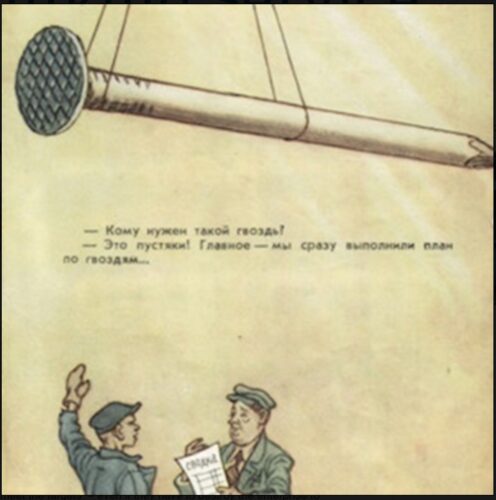
When “Forever” Ended for a Financial Prize Winner
September 21, 2025
How Rising Food Prices Change Demand
September 23, 2025A Deutsche Bahn train is late if it arrives more than 6 minutes after it is due. However, delayed trains can be canceled, erased from the schedule, and not listed as late.
By canceling trains, Germany improved its on-time statistics.
Canceled Trains
At a whopping 13,600, from 2019 to 2024, the number of canceled Deutsche Bahn long distance trains rose from 1% to 4%. Worse for regional service, the surge was up to 5%. While the railroad network needed more investment and there was a strike, creating on-time statistics further caused the cancellations that inconvenienced countless passengers.
Soviet Quotas
But to see where statistical incentives were more of a problem, we have to go to the former Soviet Union.
One example takes us to factory output quotas. When a lamp factory had a weight quota, it produced tiny lamps that were ridiculously heavy. Unmovable, a tiny lamp could feel like lead.
This satiric Russian cartoon of one nail perfectly displays where the incentive from a quota can wind up.
The dialogue says: “Who needs such a nail?” “It doesn’t matter. What’s important is that we fulfilled the plan for nails”:

Our Bottom Line: Perverse Incentives
As economists we like to think that our incentives achieve their goals. Really though, a practicality like punctuality or achieving a weight quota can nudge us into illogical territory.
Described by economist Tim Harford in Messy, these incentives didn’t work out as planned:
- When the British government proclaimed a 48-hour directive for their National Health Service, the results were not what they expected. To diminish wait time, the incentive required that physicians see their patients within 48 hours of an appointment call. Instead, the doctors got worried that they would not have enough open slots to book everyone who wanted to see them. So, they avoided advance appointments and strategically answered the phone. That 48-hour incentive increased frustration and diminished care.
- Harford also tells us that surgeons need healthy patients when their rank is based on survival rates. And universities need to reject more students when their rank relates to competitiveness. And again, punctuality became a perverse incentive when it encouraged bus drivers to skip stops that have too many people.
We can even cite a bookstore that unintentionally dissuaded people from reading War and Peace. Because their charge was based on weight, at 1225 pages, I suspect that the classic was too heavy for their $30 box of random books.
My sources and more: Thanks to my BBC World Business Report podcast for inspiring today’s post. From there this website and this one had the Deutsche Bahn details, and econlife, here and here, had the perverse incentives. I do also recommend this econtalk podcast in which Harford talks about Messy and WSJ for the story of Books by the Pound bookstore.
Please note that sections of “Our Bottom Line” were originally in this past econlife post.
![econlifelogotrademarkedwebsitelogo[1]](/wp-content/uploads/2024/05/econlifelogotrademarkedwebsitelogo1.png#100878)




